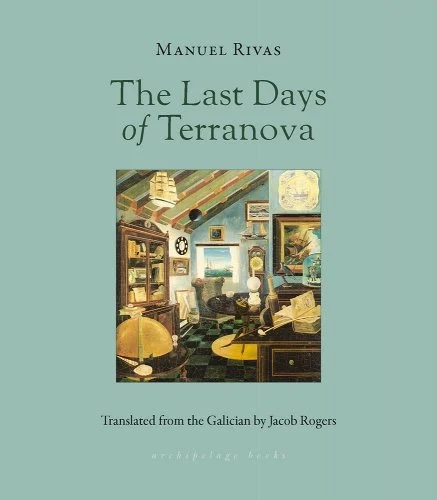Manuel Rivas
Translated by Jacob Rogers
Archipelago Books ($20)
by John Kazanjian
Manuel Rivas’s The Last Days of Terranova opens with Vicenzo Fontana watching a couple collect barnacles from a wall by the sea. Fontana considers the three of them to be bonded by this shared moment. However, he is a voyeur, removed from them; he admits that he is “witnessing something he shouldn’t, from a place he shouldn’t be.” With this, he states the novel’s thematic foundation: that the yearning to connect with other people can result in unforeseen consequences. In this scene, the man scraping barnacles disappears; Fontana calls for help and later learns the man is wanted by authorities. By inserting himself in the lives of the couple, Fontana has only provided them with trouble. Yet, despite the high stakes involved in becoming intertwined with other people, Fontana continually finds meaning by enriching his own tale with those of others.
Fontana has possessed a life-long curiosity about other people—he sees them as containers of stories. As Fontana narrates, he shares an anthology of experiences he has collected from each person that moves him. The novel shifts between Fontana’s life as he comes of age in and out of his family’s bookstore, and the rich cast of characters that have connected with the shop throughout the decades. The recently doomed bookstore, called Terranova, was founded by his father Amato four years before the beginning of Franco’s regime, and has served as a stage for diverse tales of the human condition. Some of these tales were set on paper, smuggled into the country, and delivered to Terranova. Other stories are less accessible, their full truths hidden in the minds of people who enter the shop.
The most compelling storylines feature Amato, an archaeologist, writer, and celebrated thinker whose mysterious background grows more poignant as the relationship between father and son breaks down, and Fontana’s uncle, Eliseo, who tells fantastic tales that form the backbone of the family’s mythos and cause dissonance in the novel as the line between fiction and reality becomes clearer. Fontana’s own experiences—from his time in an Iron Lung, through his stint in a metal band, to his meeting Garúa, an Argentinian fugitive whose story combines hope, loneliness, and tragedy—provide context for the other characters. Garúa finds sanctuary in Terranova as she is pursued by Argentine Anti-Communist Alliance agents, and Fontana’s evolving relationship with her is a rich aspect of the book, allowing Rivas to explore emotional complexity and resilience:
Garúa looks at the photo. It’s almost impossible not to smile when you look at this picture. It’s that spark. You’d have to put up a somber resistance not to fall under its spell. And she falls, she’s with them. Smiling on the inside.
The Last Days of Terranova is like a bookstore: One is pleasantly overwhelmed by the many rich stories that sit near one another. Each chapter begins in a different era of Fontana’s life, blurring the lines between his ordinary world and the realms in which he gains self-knowledge through his interactions with others. Jacob Rogers’s translation presents a strong narrative voice that serves as the uniting element between sections, moving us through Fontana’s earlier life with the same gravitas as more recent storylines. The text contains nuances of language and tone that communicate Fontana’s vulnerability to nostalgia and his tendency to frame events in ways that both torture and soothe him.
Although this narrative voice moves smoothly throughout the book, eventually employing a dramatic tone shift to propel readers into the novel’s plot-driven conclusion, it is frustrating that we are allowed very few moments of deeper access into the lives of Fontana’s loved ones; there are times when it feels the book would benefit from taking the focus off Fontana and delving further into the stories of the other characters more significantly. Ultimately, however, the author’s restraint is strategic: Rivas leaves it up to readers to fill in the full emotional scope of the novel through the lens of Fontana’s nostalgia. The process of doing so reminds us that though we bear witness to many characters’ stories, the narrative mosaic that Rivas has crafted belongs to one person alone. It’s a poignant achievement that Fontana’s story feels connected to our own after our time with him is finished.
Click below to purchase this book through Bookshop and support your local independent bookstore:
Rain Taxi Online Edition Spring 2023 | © Rain Taxi, Inc. 2023

